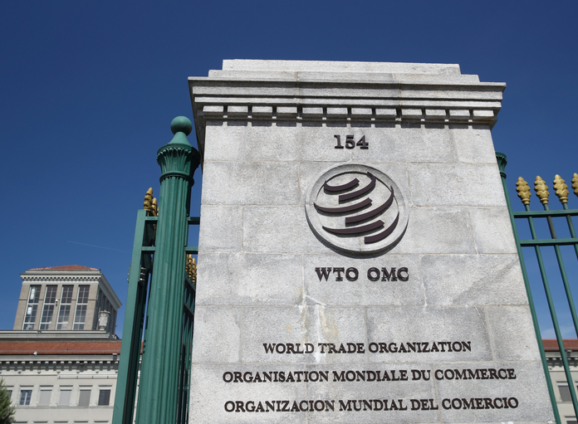Trade is the lifeblood of the global economy - it brings countries and people together and can transform our lives for the better. I’m proud that the UK’s trading offer to Ghana and over 90 other countries is amongst the most generous in the world thanks to our Economic Partnership Agreements and new Developing Countries Trading Scheme.
Globally, no country has lifted itself out of poverty without increasing its trade with the world and over the last three decades, we have seen more than a billion people escape poverty as exports from developing countries have doubled.
At the heart of this success story is the World Trade Organization (WTO) and its outstandingly successful leader Dr Ngozi Okonjo-Iweala.
Since 1995 it has set the global trading rules which provide a common, predictable, level playing field for businesses around the world. So far 164 countries accounting for over 98% of world trade have joined the WTO and its framework for trade have driven export-led growth and job creation in countries from Vietnam to Bangladesh to Ghana.
As Ministers from over 150 countries gather this week in Abu Dhabi for the WTO’s 13th Ministerial Conference (MC13), the importance of the WTO for global trade and growth is clear. It is here that the rules that will power the global economy into the next decade must be agreed. It is here that we find the opportunity to make the global trading system work better for the world’s poorest countries and ensure that we all benefit from the transformational impact of trade.
The UK wants to see a WTO which works for everyone, including the developing countries which make up almost two thirds of its membership. As set out in last year’s International Development White Paper, the UK puts the interests of developing countries at the heart of its approach to the WTO.
We are championing calls to extend lower tariffs and flexible rules for Least Developed Countries and to introduce new rules on investment facilitation that have the power to boost investment in developing countries and across the globe $250 billion.
We have been arguing for an agreement that protects our oceans and delivers sustainable fisheries, protecting coastal communities in developing countries, and we are trying to tackle food insecurity by removing harmful export restrictions on food. And we have backed up this advocacy with financial support to enable all LDC governments to attend MC13.
Of course, the WTO rules will only deliver for development if we stick to them and can challenge one another when we don’t. This requires a fully functioning Dispute Settlement System to ensure that smaller economies are not taken advantage of by bigger states engaging in unfair, unjust trading practices.
This is a priority for the UK as is ensuring that all countries have a clear voice in WTO negotiations – since 2011 the UK has provided legal, technical and financial assistance to developing countries at the WTO, most recently to Ethiopia to help prepare for its own accession.
The UK has a long history of economic cooperation with Ghana. The UK-Ghana Trade Partnership Agreement (TPA) offers Ghanaian exports duty free quota free access to the UK market. Our bilateral cooperation includes the Jobs and Economic Transformation programme, which supports Ghana to diversify and expand trade and investment. The goal is to make it quicker, easier, and cheaper for UK and Ghanaian firms to trade – no doubt an ambition that both nations share.
I’ve been impressed by the energy and commitment from negotiating teams, including Ghana, in the run up to MC13.
We now need to seize the opportunity before us to make the rules that bind us both stronger and fairer so that everyone can prosper, and no one is left behind.
-
By UK Minister of State for Development and Africa, Andrew Mitchell
Latest Stories
-
Paris 2024: Opening ceremony showcases grandiose celebration of French culture and diversity
3 hours -
Spectacular photos from the Paris 2024 opening ceremony
4 hours -
How decline of Indian vultures led to 500,000 human deaths
4 hours -
Paris 2024: Ghana rocks ‘fabulous fugu’ at olympics opening ceremony
4 hours -
Trust Hospital faces financial strain with rising debt levels – Auditor-General’s report
5 hours -
Electrochem lease: Allocate portions of land to Songor people – Resident demand
5 hours -
82 widows receive financial aid from Chayil Foundation
5 hours -
The silent struggles: Female journalists grapple with Ghana’s high cost of living
5 hours -
BoG yet to make any payment to Service Ghana Auto Group
5 hours -
‘Crushed Young’: The Multimedia Group, JL Properties surprise accident victim’s family with fully-furnished apartment
6 hours -
Asante Kotoko needs structure that would outlive any administration – Opoku Nti
7 hours -
JoyNews exposé on Customs officials demanding bribes airs on July 29
7 hours -
JoyNews Impact Maker Awardee ships first consignment of honey from Kwahu Afram Plains
8 hours -
Joint committee under fire over report on salt mining lease granted Electrochem
8 hours -
Life Lounge with Edem Knight-Tay: Don’t be beaten the third time
8 hours

